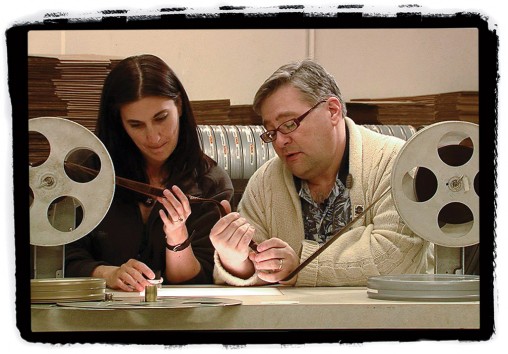
George Willeman, a 1988 Wright State graduate who is the nitrate film vault manager for the Library of Congress, will speak at the Public History Graduate Symposium March 14.
A Wright State University graduate who is the nitrate film vault manager for the Library of Congress will return to campus to deliver the keynote address at the Public History Graduate Symposium.
Scheduled for Friday, March 14, the third annual symposium will also feature presentations on research and capstone projects by public history graduate students.
The symposium, whose theme is “Legacy: The Future is Our History,” will include breakout sessions on “The Legacy of World War I,” “Interpreting Local History” and “Women with Nerve.”
“Participants will gain knowledge and insight into the remarkable history of their hometown, region and the people who made it what it is,” said Dawne Dewey, head of Special Collections and Archives and director of the Public History program at Wright State.
The free daylong symposium will be held in the Student Union Endeavour Room. The deadline to register is March 7. RSVP by calling the Wright State University Archives at (937) 775-2092 or signing up online.
The symposium will focus on the fact that “we are making our history right now,” Dewey said. “We determine, based on the decisions we make, what our history will look like, how it will be recorded in the years to come. We can learn from the stories of the past and ensure that our legacy is one to be proud of.”
The keynote address will be delivered by George Willeman, who graduated from Wright State’s motion pictures program in 1988 and is an expert in both the preservation of motion picture film and the film industry in the 20th century.
He will discuss his work as nitrate film vault manager, the importance of preserving motion picture film history and how that history helps preserve the past and form the future.
“His job at the Library of Congress directly ties in to what public historians do—preserve and make accessible the history of the past,” Dewey said.
Willeman has worked at the Library of Congress’ film preservation laboratory and nitrate film vaults since he was a student at Wright State. At that time, the laboratory and nitrate film vaults were housed at Wright-Patterson Air Force Base in Dayton.
Today, he’s the nitrate film vault manager at the Library of Congress Packard Campus for Audio-Visual Conservation in Culpeper, Va., responsible for the more than 150,000 cans of nitrate film in the library’s collection.
“It’s really nerdy,” he said, “but I just love being around these reels of film and being a part of making sure that they’re preserved so that people can see them later on.”
Preservation is particularly important for the nitrate films that Willeman is responsible for. Used extensively from the late 1800s until the 1950s, nitrate film is highly flammable and must be kept in climate-controlled vaults.
With many of the early 20th century’s most beloved films in danger of going up in flames, it’s up to Willeman to rescue and safeguard these movies for future generations.
Willeman is featured in These Amazing Shadows, a 2011 documentary chronicling the history of the National Film Registry and exploring the impact of its films on American culture. Up to 25 titles are selected annually to the National Film Registry for preservation in the Library of Congress.
Willeman can also be heard talking about movies every week on Filmically Perfect with J. Todd Anderson, a filmmaker and storyboard artist, on WYSO Public Radio.
The Public History Graduate Symposium is organized by Wright State’s Public History Program and sponsored by the College of Liberal Arts Dean’s Office, Department of History and Department of Theatre, Dance and Motion Pictures.
Read more about George Willeman and the National Film Registry in the spring 2013 issue of the Wright State University Magazine.

 Celebrated Wright State alum serving his community as surgeon
Celebrated Wright State alum serving his community as surgeon  Wright State University Foundation awards Students First Fund grants
Wright State University Foundation awards Students First Fund grants  Cosmic collection
Cosmic collection  Wright State revives student-faculty collaborative writing journal
Wright State revives student-faculty collaborative writing journal  Fulfilling dreams
Fulfilling dreams 